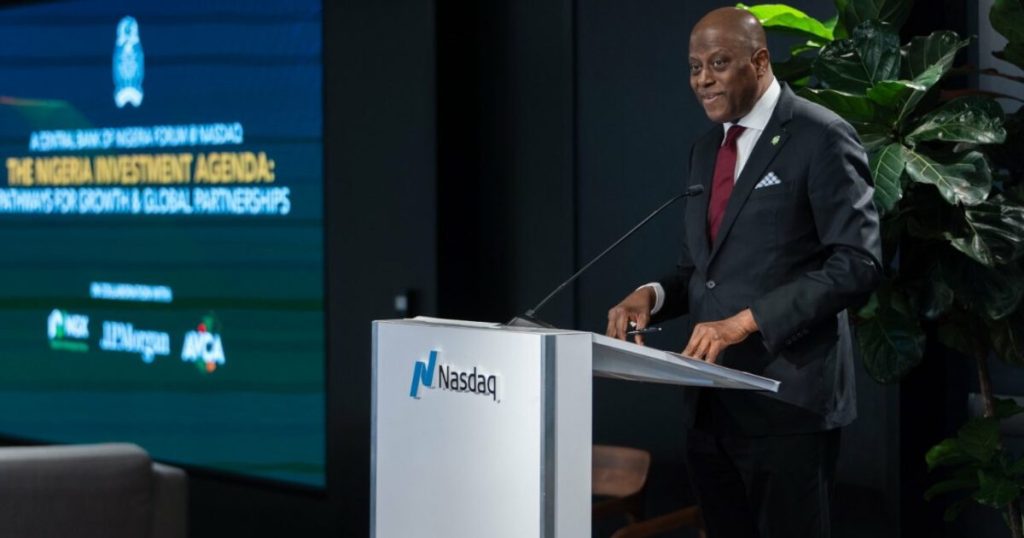The Central Bank of Nigeria (CBN) Governor, Olayemi Cardoso, engaged in a significant dialogue with Nobel laureate economist, Dr. James Robinson, at an event designed to illuminate the CBN’s current monetary policy direction. The discussion, held on Friday and subsequently detailed in a statement released on the CBN’s official X (formerly Twitter) handle, served as a platform for Cardoso to reaffirm the bank’s unwavering commitment to transparency, consistency, and the restoration of public trust through the implementation of conventional monetary policy reforms. Cardoso’s emphatic declaration, “We inherited a crisis of confidence, but we chose a different path. We’re not turning back,” resonated with the audience of economic stakeholders, policymakers, and financial experts, signaling a firm resolve to navigate Nigeria’s economic challenges with a renewed approach.
The event, opened by Nasdaq President Tal Cohen, attracted a diverse and influential gathering of Nigerian professionals and global financial leaders. This underscores the significance of the dialogue and the CBN’s efforts to engage with a broad spectrum of stakeholders. Dr. Nkiru Balonwu, CBN Adviser on Stakeholder Engagement, served as the anchor, guiding the conversation, while Temi Popoola, Group CEO of the Nigerian Exchange Group, moderated the ensuing question and answer session, facilitating a dynamic exchange of ideas and perspectives. The concluding remarks were delivered by Dr. Olubukola Akinniyi Akinwunmi, Director of the CBN’s Banking Supervision Department, providing a concluding perspective on the central bank’s regulatory role.
The presence of CBN Board and Monetary Policy Committee members—Mr. Robert Agbede, Prof. Melvin Ayogu, and Dr. Aloysius Ordu—highlighted the CBN’s global outreach and strategic collaboration with the Nigerian diaspora. Their participation symbolized the apex bank’s increasing engagement with Nigerian professionals based abroad, reflecting a commitment to harnessing homegrown expertise to propel the nation’s economic transformation. This strategy recognizes the valuable contributions that Nigerian professionals in the diaspora can make to the country’s economic development.
This high-level engagement between the CBN Governor and a Nobel laureate economist signifies a strategic move to address the prevailing economic challenges facing Nigeria. Cardoso’s assertion of a departure from past practices and the adoption of a more transparent and consistent approach aims to rebuild confidence in the CBN’s monetary policies. The event also served as a platform to communicate the CBN’s renewed focus on engaging with Nigerian professionals abroad, recognizing the potential of their expertise to contribute significantly to national economic growth.
The choice to hold this discussion with Dr. Robinson, an expert on the role of institutions in economic development, underlines the CBN’s focus on building stronger institutional frameworks to support sustainable economic growth. This approach suggests a recognition of the importance of robust and transparent institutions in fostering investor confidence and attracting both domestic and foreign investment. By emphasizing orthodox monetary policy reforms, the CBN signals its intention to adhere to established economic principles and best practices, further bolstering credibility and stability within the financial system.
In conclusion, the CBN’s engagement with Dr. Robinson, coupled with the presence of key stakeholders and members of the Nigerian diaspora, signifies a strategic effort to reshape the narrative surrounding Nigeria’s economic outlook. By emphasizing transparency, consistency, and a renewed commitment to orthodox monetary policy, the CBN aims to restore confidence and foster an environment conducive to sustainable economic growth. The strategic outreach to Nigerian professionals abroad further underscores the bank’s commitment to leveraging all available resources and expertise to drive the nation’s economic transformation. This dialogue represents a crucial step in the ongoing efforts to navigate Nigeria’s economic complexities and build a more resilient and prosperous future.














